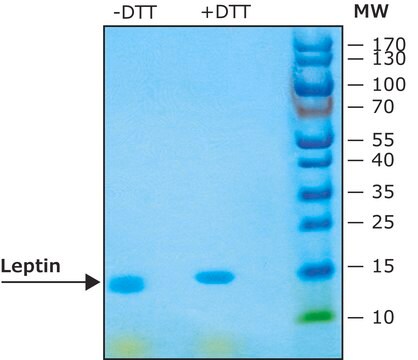L4146
Leptin human
≥97% (SDS-PAGE), recombinant, expressed in E. coli, lyophilized powder
Synonym(s):
OB
Sign Into View Organizational & Contract Pricing
All Photos(2)
About This Item
Recommended Products
recombinant
expressed in E. coli
Quality Level
sterility
sterile; 0.2 μm filtered
Assay
≥97% (SDS-PAGE)
form
lyophilized powder
potency
≤3.0 ng/mL ED50/EC50
mol wt
predicted mol wt ~16 kDa
impurities
≤1.0 EU/μg endotoxin
UniProt accession no.
shipped in
ambient
storage temp.
−20°C
Gene Information
human ... LEP(3952)
General description
The gene LEP (leptin) is mapped to human chromosome 7q31. It is a 16kDa peptide. Leptin is released in the circulation and goes to the CNS (central nervous system). In CNS, it works by associating with leptin receptor.
Application
Leptin human has been used:
- to study the effect of leptin on ACAT1 (acyl-coenzyme A:cholesterol acyltransferase 1) expression and cholesterol efflux from primary cultured human macrophages
- to study the effect of leptin on expression of IGFBP2 (insulin growth factor binding protein 2) in skeletal muscle
- to study the effect of leptin on HLA-G (human leukocyte antigen G) expression in placental trophoblasts
- to study the effect of leptin on in vitro maturation, fertilization and development of horse oocytes after ICSI (intracytoplasmic sperm injection)
Biochem/physiol Actions
Leptin is a hormone produced primarily in adipocytes, although leptin mRNA has also been identified in placenta and fetal tissues, gastric tissue and liver. Its primary site of action appears to be on neurons in the hypothalamus that are involved in regulating energy balance, appetite, and body weight. Leptin increases the production of nitric oxide in endothelial cells and stimulates angiogenesis in vitro and in vivo.
Human and mouse leptin share ~84% sequence identity.
Human and mouse leptin share ~84% sequence identity.
Leptin is believed to play a role in normal pregnancy development.
Mutations in LEP (leptin) are linked with type-2 diabetes. Presence of high levels of leptin in plasma is related to adiposity.
Physical form
Lyophilized from a 0.2 μm filtered solution with 0.0045 mM NaHCO3
Analysis Note
The biological activity is measured by its ability to induce proliferation of leptin-dependent human OB-R transfected murine BAF3 cells.
Storage Class Code
11 - Combustible Solids
WGK
WGK 3
Flash Point(F)
Not applicable
Flash Point(C)
Not applicable
Personal Protective Equipment
dust mask type N95 (US), Eyeshields, Gloves
Certificates of Analysis (COA)
Search for Certificates of Analysis (COA) by entering the products Lot/Batch Number. Lot and Batch Numbers can be found on a product’s label following the words ‘Lot’ or ‘Batch’.
Already Own This Product?
Find documentation for the products that you have recently purchased in the Document Library.
Customers Also Viewed
Shih-Ping Cheng et al.
Oncology reports, 23(6), 1721-1727 (2010-04-30)
Excess body weight is associated with a moderately increased risk of thyroid cancer. Adipocyte-derived hormone, leptin, has been shown to enhance cell growth and migration in many cancer types. Limited evidence suggests that leptin has direct actions on the thyroid
Eiji Kashiwagi et al.
American journal of translational research, 12(6), 3033-3045 (2020-07-14)
Adipocytokines such as leptin and adiponectin have functions in metabolism as well as the development and progression of various types of malignancies. However, little is known about their role in bladder cancer. In this study, we investigated whether leptin, adiponectin
Elisabetta Trevellin et al.
Oncotarget, 6(13), 11203-11215 (2015-04-11)
Obesity is associated with cancer risk in esophageal adenocarcinoma (EAC). Adipose tissue directly stimulates tumor progression independently from body mass index (BMI), but the mechanisms are not fully understood. We studied the morphological, histological and molecular characteristics of peritumoral and
L Pérusse et al.
Obesity research, 9(2), 135-169 (2001-04-24)
This report constitutes the seventh update of the human obesity gene map incorporating published results up to the end of October 2000. Evidence from the rodent and human obesity cases caused by single-gene mutations, Mendelian disorders exhibiting obesity as a
Shigeki Hongo et al.
American journal of physiology. Endocrinology and metabolism, 297(2), E474-E482 (2009-07-25)
Leptin is an adipose tissue-derived hormone implicated in atherosclerosis and macrophage foam cell formation. The current study was conducted to examine the effect of leptin on cholesteryl ester accumulation in human monocytes/macrophages. Exogenously added leptin at 5 nM during differentiation
Our team of scientists has experience in all areas of research including Life Science, Material Science, Chemical Synthesis, Chromatography, Analytical and many others.
Contact Technical Service







